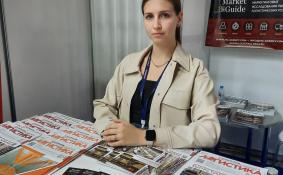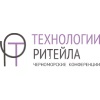
научно-практический
журнал

Новости редакции
18 ноября Президент Российского Союза химиков Виктор Иванов лично вручил директору «Агентства Маркет Гайд» и издателю журнала «ЛОГИСТИКА» Юлии Кисловой сертификат, подтверждающий членство агентства в Российском Союзе химиков.
Дорогие читатели! Десятый номер журнала «Логистика» открывается большим материалом, посвященным итогам Делового форума БРИКС, прошедшем 18 октября 2024 г. в Москве. Директор ООО «Агентство Маркет Гайд» и издатель журнала «ЛОГИСТИКА» Юлия Кислова побывала на мероприятии и подготовила статью, где особое внимание уделила международной торговле и логистической связанности стран объединения. Подробности – в номере.
Директор ООО «Агентство Маркет Гайд» и издатель журнала «ЛОГИСТИКА» Юлия Кислова посетила форум «Международный день торговли – 2024», который прошел 7 ноября 2024 г. в Москве, в Торгово-промышленной палате Российской Федерации. Основной темой форума стало международное сотрудничество и межрегиональная кооперация. Организатором форума выступила Ассоциация экспортеров и импортеров.
Статья недели:

ФОТО НЕДЕЛИ
ЦИТАТЫ
События в российской логистике
At least 10 new international retailers to enter Russian market in 2016
Moscow, 22 January 2016, - According to the latest retail research by global property advisor CBRE, retail turnover and retailer margins have declined, as a result of higher prices and lower consumer purchasing power. These factors have led to the main trend in 2015 - the period of shopping centre populating with tenants has increased and the vacancy rate has gone up to 9.5%.
Low consumer purchasing power forced retailers and suppliers to control prices “manually”. However, new cycle of price growth can begin in 2016 due to a new round of rouble devaluation and existing product embargo.
The total stock of modern retail space in Moscow reached 5.2 mln. sq m, or 424 sq m per 1,000 inhabitants. As some projects’ openings have been postponed to 2016, the pace of completions have slowed down, the actual new supply was 40% lower than the forecast announced in the beginning of 2015.
Despite some negative macroeconomic factors, international retailers are still interested in the Russian market. 40 international retailers entered the Moscow market in 2015, with ASUS Republic of Gamers, Mafrat, Malo, Orient, Seiko, Tchibo, Wrangler among examples. 40% of new retail chains opened their first stores in the shopping centres delivered in 2015 (Aviapark, Tsentralny Detsky Magazin on Lubyanka, Kuntsevo Plaza) and in the most popular high street retail destinations (20%).
At the same time, due to optimization of development strategy, 11 international retailers left the Russian market during the year. The most ‘painful’ for the market were exits of such retail chains as Stockmann, Camaieu, Lindex and Rockport.
The trend of technical openings and the growth of average vacancy rate due to reducing retailers′ activity increase the interest of developers to unusual tenants. For example, in some shopping malls chain retailers were replaced with private entrepreneurs. Some unusual formats like farmers markets, dancing studios, art galleries, interactive theatres, quests appeared in shopping malls.
The key trends of the retail property market for 2016:
1. In 2016 prices will continue to rise under the pressure of macroeconomic and geopolitical factors. In this case, major grocery retail chains and retailers of “middle –“ and “economy” price segments will keep strong market positions.
2. Developers announce the delivery of 17 shopping malls with a total rentable area of 560,000. However, due to the high level of uncertainty and risk on the demand side, openings of new projects even at a high stage of construction could be postponed by 1-2 quarters. As a result, the actual completions will reach 60-70% of announced retail schemes.
3. If the amount of new supply in 2016 remains comparable to 2015 figure, and retailers activity remains low, the average vacancy rate could rise from current 9.5% to 11% by the end of 2016.
4. Average vacancy rate in shopping centres delivered in 2014-2015 continues to decline and may reach 15-17%.
5. The most expected projects in 2016 are Riviera, Riga Mall, Galereya Kutuzovsky, Polezhaevsky, Butovo Mall, Kosino Park and the 2nd phase of Metropolis.
6. At least 10 new international retailers have announced their plans to enter the Moscow market in 2016, including such retail chains as John Varvatos, Kidzania, Superdry, Tallinder, Victoria’s Secret Pink.
7. By the end of 2015, most retailers have revised development strategies for 2016, which implies not only the closure or reduction of stores but also further chain development. For example, further expansion announced such key market players as OBI, Leroy Merlin, Decathlon, fashion retailers (H&M, Mango, Uniqlo, Mango, Monki, Forever 21, Furla), and popular fast-food chains (McDonald’s, KFC, Baskin Robbins, Hesburger, Subway, Nathan’s Famous).
8. Developers will continue to strengthen the entertainment component of shopping malls to attract new consumers. Most likely, new edutainment formats as well as innovative entertainment concepts for teenagers and adults will appear in 2016.
Michael Rogozhin, Managing Director of Retail Department CBRE in Russia, comments:
“As a result of the economic crisis, access to financial instruments for the developers became prohibitively expensive, and start of new projects became unprofitable. Thus, probability of new shopping malls development starts during 2016 is very low. Projects at an advanced stage of construction with secured financing will be completed with high certainty. The same is true to the developers that will be able to find co-investor, for example large retailer. Increased competition together with declined retail sales may encourage some owners to conduct a re-conception, tenant rotation or re-positioning of their schemes.
There is still an imbalance between supply and demand in the Moscow retail property market: new delivery of shopping malls exceeds absorption of retail space. Thus, vacancy rate will continue increasing and could reach 11% in 2016. In 2017 after twofold reduction of completions and given economic recovery, the vacancy rate could start declining.”











